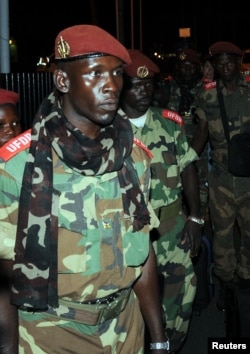The government of the Central African Republic said a recent attack by insurgents on a southern town shows the Seleka rebel group is still intent on occupying the country.
Seleka forces launched an assault Monday on Bangassou, which lies near the country's border with the Democratic Republic of Congo. The attack comes just months after the rebels signed a peace accord with the government.
The defense ministry condemned the attack, saying it is "one more action that confirms Seleka's intention to continue by all means to occupy the national territory."
Rebels accuse the government of President Francois Bozize of not applying the terms of the peace agreement.
They accuse the government of starting hostilities and are calling for the release of political prisoners and the withdrawal of foreign troops in the country.
Seleka fighters launched an uprising in December and seized one-third of the country.
On January 11, the government and rebels agreed to a peace plan that allows President Bozize to remain in power until his term ends in 2016.
Under the agreement, the president appointed Nicolas Tiangaye, an opposition lawyer, as prime minister.
Seleka is made up of fighters from three rebel groups in the country's north. The alliance said President Bozize had failed to carry out previous peace agreements from 2007 and 2008.
Some information for this report was provided by AFP and Reuters.
Seleka forces launched an assault Monday on Bangassou, which lies near the country's border with the Democratic Republic of Congo. The attack comes just months after the rebels signed a peace accord with the government.
The defense ministry condemned the attack, saying it is "one more action that confirms Seleka's intention to continue by all means to occupy the national territory."
Rebels accuse the government of President Francois Bozize of not applying the terms of the peace agreement.
They accuse the government of starting hostilities and are calling for the release of political prisoners and the withdrawal of foreign troops in the country.
Seleka fighters launched an uprising in December and seized one-third of the country.
On January 11, the government and rebels agreed to a peace plan that allows President Bozize to remain in power until his term ends in 2016.
Under the agreement, the president appointed Nicolas Tiangaye, an opposition lawyer, as prime minister.
Seleka is made up of fighters from three rebel groups in the country's north. The alliance said President Bozize had failed to carry out previous peace agreements from 2007 and 2008.
Some information for this report was provided by AFP and Reuters.





